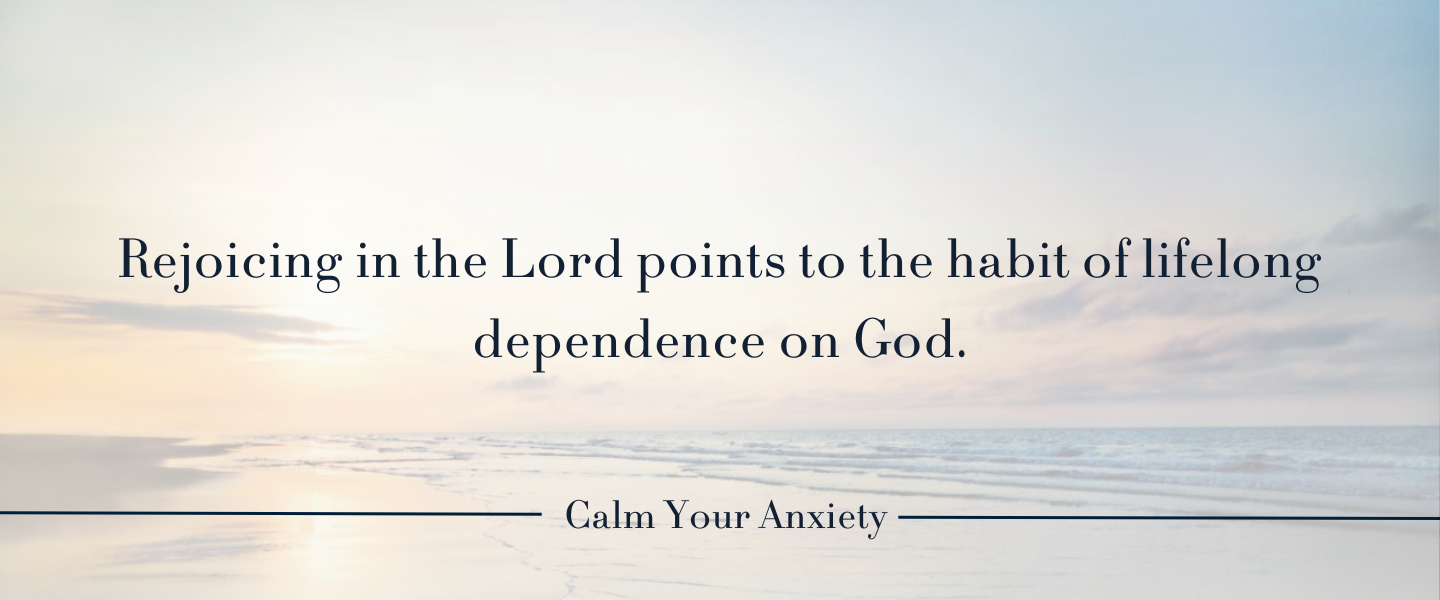Calm Your Anxietyنموونە


The Habits Of Joy And Dependence
According to the Bible, one step toward overcoming anxiety is cultivating the attitude of rejoicing. Philippians 4:4, 6 tells us to rejoice in the Lord “always” and not to be anxious about anything. It’s possible for you to be joyful today. Calming your anxiety and waging war on worry begins with choosing to tap into the Lord Himself as the fountainhead of hope and as our reservoir of joy.
What does it actually mean to “rejoice in the Lord”? After considering this for many years, I’ve come to see it as not only a command we obey but a choice we make. As a command, this is something God expects. It’s a part of obedience and righteousness, and neglecting it is a sin. God wants you to enjoy life. We ought to have joy, and it’s not optional. It is a command from the God of all joy, who doesn’t want His children doubting His providence, distrusting His promises, or discounting His sovereignty. But it is not only a command we obey; it’s a choice we make.
Choosing joy doesn’t turn a blind eye to our pain, but demonstrates our willingness to trust God so much that our attitudes are affected. We all battle discouragement. We struggle with anxiety. But with the power of Scripture and the indwelling of the Holy Spirit, we can learn to regulate our emotions. I can pause and commit my worry to the Lord’s keeping and rejoice that He is present and able to meet my need. This is what it means to rejoice in the Lord. I can nurture a relationship with Jesus that transforms me by renewing my mind. I can process my emotions in a way that allows me to continually cycle back to joy. You and I can begin today! Start immediately by inscribing “Rejoice in the Lord!” on the walls of your mind. Repeat it often.
Rejoicing in the Lord points to the habit of lifelong dependence on God. Of relying on God. Of looking to God for peace, wisdom, and healing. This habit is developed especially through the practice of prayer. Pray when we don’t know what to do, when our problems seem unsolvable, and when our burdens keep us awake at night. Human advice may help, but nothing compares to taking our burdens to the Lord and processing them through prayer so as to arrive at guidance, wisdom, and peace.
To be anxious or to worry means to be pulled in different directions. God’s Word assures us from start to finish that nothing should agitate us, because nothing can separate us from the love of a God for whom nothing is impossible (see Romans 8:38–39; Matthew 19:26). Dependence on God makes us rich in peace that transcends understanding (see Philippians 4:7). Truthfully, I have a hard time accepting this biblical premise to depend on God rather than to be anxious. Yet as we turn our anxieties over to the Lord, He goes to work on them. He is able to guard what we have entrusted to Him (see 2 Timothy 1:12). God, being God, doesn’t worry, but He does work. The only way to transfer our cares to God is through prayer. As we transfer our legitimate worries into the Lord’s mighty hands, He transfers His inexpressible peace into our fragile hearts.
Respond
How is an attitude of joy different from the emotion of happiness? What does it mean for you to choose to rejoice in the Lord?
How can the power of Scripture and the indwelling of the Holy Spirit help you build daily habits that nurture your relationship with Jesus?
How can you build dependence on God through prayer?
About this Plan

This plan includes five daily readings based on Robert J. Morgan’s book Calm Your Anxiety. The reading plan will explore how to change your life by learning to manage your anxiety through the nurturing of a biblical, close, joyful relationship with God.
More
پلانە پەیوەستەکان

Hope

The Mended Rib: A 27-Day Devotional for Men Battling Lust and Infidelity

Know Your Role

Blessings & Battlefields: A Healing Walk With God 3 Steps to Engage God’s Healing
Journeying Through Advent

Content With Discontent: Killing Comparison With Gratitude

In the Hospital? Comfort and Encouragement for You

Praying and Waiting for Christmas: A 7 Day Advent Devotional

A Season of Waiting
